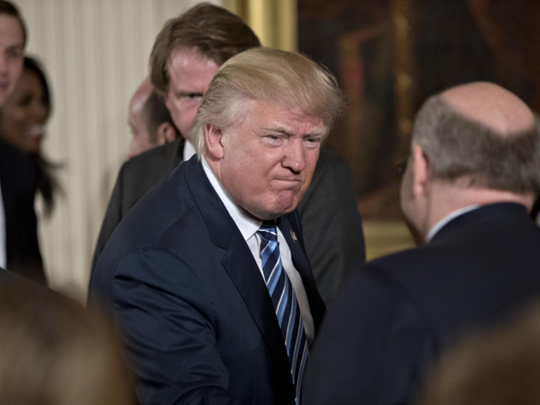
The inauguration of the 45th president of the United States was the focus of media attention. Donald Trump’s inaugural address, which was expected to outline his policies, was badly mauled.
“Instead of summoning the best in America’s ideals, Mr Trump offered a fantastical version of America losing its promise, military dominance and middle-class wealth to ‘the ravages of other countries making our products, stealing our companies and destroying our jobs’,” the New York Times said in an editorial.
“With sweeping exaggeration, Mr Trump spoke of ‘carnage’ in the inner cities. He deplored all of this decline as a betrayal of America, implicitly trashing the four former presidents who sat listening behind him at the inaugural ceremony. Those presidents, Democratic and Republican, must have put Mexico first, or perhaps Sweden, or China. Offering himself as a kind of saviour, the leader of a ‘historic movement, the likes of which the world has never seen before,’ Mr Trump proclaimed he would have a different priority: ‘America First! America First!’,” the paper said.
Los Angeles Times was equally scathing in its editorial, saying Trump’s recycled campaign speech made no effort to bring Americans together.
“The speech was a virtual Greatest Hits of Trump campaign cliches, from ‘America First’ to ‘America will start winning again, winning like never before’ to, of course, the climactic closing in which the president pledged (you guessed it) to ‘Make America great again’,” the paper said. “If Trump governs effectively — a big if, based on all that we’ve seen of him so far — it will matter little that he delivered a hackneyed and unmemorable inaugural address. Still, this speech offered the new president a unique opportunity to reintroduce himself to the American people. He squandered it.”
In the United Kingdom, The Guardian cast the spotlight on Theresa May’s Brexit speech describing it as a doubly depressing event.
“It was a reality check for those who hope the UK can stay in the single market at the same time as leaving the European Union. But it was riddled with its own streak of global fantasy. It was a reminder that Britain’s exit from the EU puts livelihoods, values and alliances at risk. Yet it was also shot through with unsupported optimism about UK economic performance, trade prospects and the readiness of the remaining EU-27 to strike the kind of deal that would suit the UK government,” the paper said in an editorial.
“Mrs May talked about compromise, and she said it was important for many sectors of the UK economy — she name-checked several besides the City of London — to retain access to the single market. But she was confrontational too, saying that no deal would in the end be better than a bad deal. That will play well in the Europhobic press. But it is a bluff. It may backfire at the negotiating table, especially as she looks for the transitional implementation deal she rightly committed to seeking. Mrs May is a politician who needs to preside over a growing, not a failing, economy by the time of the first post-Brexit general election. The decision to allow migration to trump the single market may seem hard-headed, but it makes that goal less easy to achieve,” the paper said.
South China Morning Post chose to highlight President Xi Jinping’s staunch defence of the world economic order, saying that it was in stark contrast to the protectionist sentiment sweeping the West. The paper urged Beijing to forge ahead with reforms to protect the gains of globalisation.
“The irony of the world’s most powerful communist leader defending the capitalist system is testament to the threat of protectionism to the global economy. President Xi Jinping’s keynote speech to the World Economic Forum in Davos, Switzerland, was a spirited defence of globalisation against forces trying to turn some major economies inwards. Amid rising fears of isolationism that would wind back the unprecedented benefits of international trade and economic integration, Xi insisted that globalisation was not to blame for the economic woes that had led populist political leaders to question it,” the Hong Kong-based paper said in an editorial.
“He made it clear China must play its part by reforming its economy and making it more open. It could start with projecting leadership by seriously implementing new policy guidelines aimed at addressing obstacles to foreign investment and companies, thus leading by example in protecting the gains of globalisation,” the paper said.




_resources1_16a31069e4e_small.jpg)




